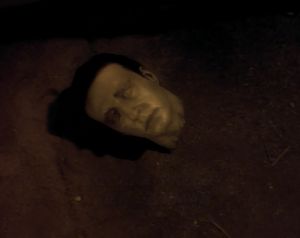| |||||||||||
| |||||||||||
|
Spoiler-free notes: There's always been something that bugged me about this episode, but it wasn't until this rewatch that I finally put my finger on it. Though I like lots of things about it and the story is as big as previous two-parters, the tone is much lighter. I don't believe every episode should be heavy and serious, but in order to justify its position as a season-bookending cliffhanger, the characters should behave as though the stakes couldn't be higher. If it stood alone, "Time's Arrow" would be a perfectly good episode--maybe even a great one--but if you put it side by side with "The Best of Both Words" and "Redemption," it just can't hold a candle. The cute antics with Mark Twain, Jack London, Mrs. Carmichael, etc., while fun, only serve to mask the point that people are being slaughtered by time-travelling aliens and that Data's death seems all but certain. With that out of the way, though, I do enjoy those cute antics, and the treatment of Mark Twain is downright inspired. I like that the show takes a stab at explaining the enigmatic relationship between Picard and Guinan, though it still only scratches the surface (it doesn't explain why their friendship is "so much more than that," for example). And though I have some issues with the neatness and convenience of some of the time travel plot devices, it is incredibly clever how Data's head is reattached to his body in the future. Still, there are nitpicks to be had. Probably the biggest oversight in the entire narrative is the alien antagonists. Not only does one of the bad guys unceremoniously escape, but their motivation is full of unexplained plot holes. Why do they need human "neural energy" to survive? How have they had access to such crazy time travel technology without totally screwing up history? What's with all that nonsensical "synchronic distortion" stuff? What became of the technologically superior ophidian? And why did it randomly explode when Data and the alien were tussling over it? I really don't want to end these notes with the impression that I think this episode is fatally flawed, because as I said, there are plenty of things to like about it. It is far superior to many of the show's other episodes that keep a lighter tone, and it does a good job fleshing out one of the show's more neglected yet fascinating characters (Guinan). The exchange between Twain and Troi, when Troi tries to explain how the future is a vast improvement over the past, is very true to Roddenberry's seminal ideas, a good expression of one of Star Trek's central themes. Rewatching it was fun, and I can't escape the conclusion that my hang-ups with "Time's Arrow" are almost entirely a result of the bar being set so high by "The Best of Both Worlds" and "Redemption." | |||||||||||
|
| |||||||||||
| |||||||||||
|
Copyright ©2012 e. magill. All rights reserved.
|

